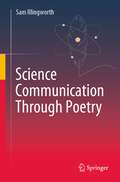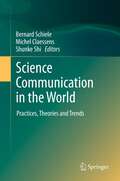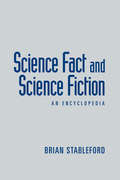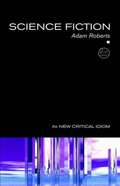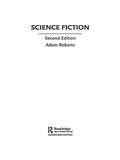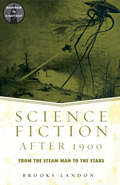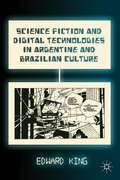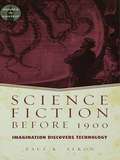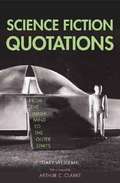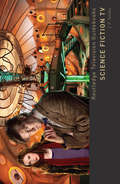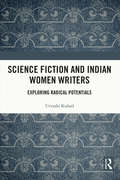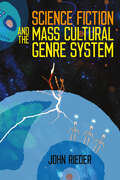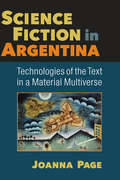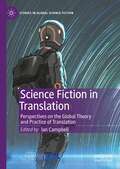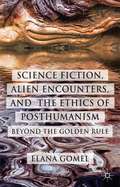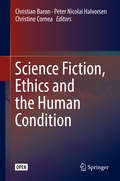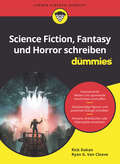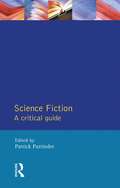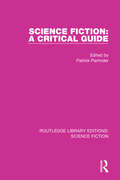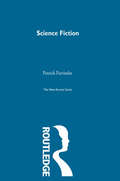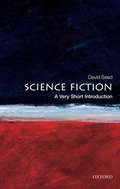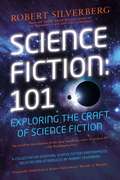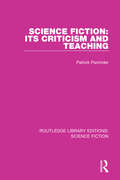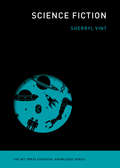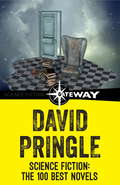- Table View
- List View
Science Communication Through Poetry
by Sam IllingworthScience Communication Through Poetry aims to explore how we might communicate science effectively both to and with non-scientific audiences across the spectrum of science communication, from dissemination to dialogue, via the medium of poetry. It has been written for scientists, science communicators, public engagement practitioners, and poets, so that they can learn how to use poetry as an effective tool through which to diversify science. As well as containing specific advice and guidance for how to use poetry to communicate science with different audiences, this book contains a number of exercises for the reader to reflect on what has been learnt and to put into practice what is discussed. Further study and additional readings are also provided to help improve knowledge, understanding, and familiarity with both poetry and science communication.
Science Communication in the World
by Michel Claessens Shunke Shi Bernard SchieleThis volume is aimed at all those who wonder about the mechanisms and effects of the disclosure of knowledge. Whether they have a professional interest in understanding these processes generally, or they wish to conduct targeted investigations in the PCST field, it will be useful to anyone involved in science communication, including researchers, academics, students, journalists, science museum staff, scientists high public profiles, and information officers in scientific institutions.
Science Fact and Science Fiction: An Encyclopedia
by Brian StablefordScience fiction is a literary genre based on scientific speculation. Works of science fiction use the ideas and the vocabulary of all sciences to create valid narratives that explore the future effects of science on events and human beings. Science Fact and Science Fiction examines in one volume how science has propelled science-fiction and, to a lesser extent, how science fiction has influenced the sciences. Although coverage will discuss the science behind the fiction from the Classical Age to the present, focus is naturally on the 19th century to the present, when the Industrial Revolution and spectacular progress in science and technology triggered an influx of science-fiction works speculating on the future. As scientific developments alter expectations for the future, the literature absorbs, uses, and adapts such contextual visions. The goal of the Encyclopedia is not to present a catalog of sciences and their application in literary fiction, but rather to study the ongoing flow and counterflow of influences, including how fictional representations of science affect how we view its practice and disciplines. Although the main focus is on literature, other forms of science fiction, including film and video games, are explored and, because science is an international matter, works from non-English speaking countries are discussed as needed.
Science Fiction (Second Edition)
by Adam RobertsScience Fiction is a fascinating and comprehensive introduction to one of the most popular areas of modern culture. This second edition reflects how the field is rapidly changing in both its practice and its critical reception
Science Fiction (The New Critical Idiom #Vol. 39672)
by Adam RobertsScience Fiction is a fascinating and comprehensive introduction to one of the most popular areas of modern culture. This second edition reflects how the field is rapidly changing in both its practice and its critical reception. With an entirely new conclusion and all other chapters fully reworked and updated, this volume includes: a concise history of science fiction and the ways in which the genre has been used and defined explanations of key concepts in Science Fiction criticism and theory through chapters such as Gender, Race, Technology and Metaphor examines the interactions between Science Fiction and Science Fact anchors each chapter with a case study drawn from short story, book or film, from Frank Herbert’s Dune to Star Wars, from The Left Hand of Darkness to Neuromancer. Introducing the reader to nineteenth-century, Pulp, Golden Age, New Wave, Feminist and Cyberpunk science fictions, this is the essential contemporary guide to a major cultural movement.
Science Fiction After 1900: From the Steam Man to the Stars (Genres in Context)
by Brooks LandonFirst published in 2003. Routledge is an imprint of Taylor & Francis, an informa company.
Science Fiction And Digital Technologies In Argentine And Brazilian Culture
by Edward KingFictional narratives produced in Latin America often borrow tropes from contemporary science fiction to examine the shifts in the nature of power in neoliberal society. King examines how this leads towards a market-governed control society and also explores new models of agency beyond that of the individual.
Science Fiction Before 1900: Imagination Discovers Technology (Genres in Context #Vol. 3)
by Paul K. AlkonPaul Alkon analyzes several key works that mark the most significant phases in the early evolution of science fiction, including Frankenstein, Twenty Thousand Leagues Under the Sea, A Connecticut Yankee in King arthur's Court and The Time Machine. He places the work in context and discusses the genre and its relation to other kinds of literature.
Science Fiction Quotations: From the Inner Mind to the Outer Limits
by Arthur C. Clarke Gary WestfahlIn this unprecedented collection of science fiction and fantasy quotations, the reader revisits the stunning moment when Mary Shelley's Frankenstein monster first comes to life; witnesses the transformation of Robert Louis Stevenson's Dr. Jekyll into Mr. Hyde; is present when Bruce Wayne resolves to become Batman; and overhears the cosmic conclusions of The Incredible Shrinking Man. Drawing upon two centuries of the vast and provocative literature of science fiction and fantasy, this comprehensive book presents more than 2,900 quotations from wide-ranging sources, including science fiction and fantasy stories, novels, films, and television programs. The quotations are organized by topic-alien worlds; darkness and light; robots, androids, and cyborgs; machines and technology; weapons; and more than one hundred others. The reader will encounter the wit and wisdom of renowned authors (H. G. Wells, Ray Bradbury, J. R. R. Tolkien, Ursula K. Le Guin) along with definitive versions of such important statements as Isaac Asimov's Three Laws of Robotics and Star Trek's Prime Directive. With its thorough index, this book is both an invaluable resource for the writer or scholar and an irresistible page-turner for the curious browser.
Science Fiction TV (Routledge Television Guidebooks)
by J. P. TelotteThe first in the Routledge Television Guidebooks series, Science Fiction TV offers an introduction to the versatile and evolving genre of science fiction television, combining historical overview with textual readings to analyze its development and ever-increasing popularity. J. P. Telotte discusses science fiction’s cultural progressiveness and the breadth of its technological and narrative possibilities, exploring SFTV from its roots in the pulp magazines and radio serials of the 1930s all the way up to the present. From formative series like Captain Video to contemporary, cutting-edge shows like Firefly and long-lived popular revivals such as Doctor Who and Star Trek, Telotte insightfully tracks the history and growth of this crucial genre, along with its dedicated fandom and special venues, such as the Syfy Channel. In addition, each chapter features an in-depth exploration of a range of key historical and contemporary series, including: -Captain Video and His Video Rangers -The Twilight Zone -Battlestar Galactica -Farscape -Fringe Incorporating a comprehensive videography, discussion questions, and a detailed bibliography for additional reading, J. P. Telotte has created a concise yet thought-provoking guide to SFTV, a book that will appeal not only to dedicated science fiction fans but to students of popular culture and media as well.
Science Fiction and Indian Women Writers: Exploring Radical Potentials
by Urvashi KuhadScience fiction, as a literature of fantasy, goes beyond the mundane to ask the question: what if the world were different from the way it is? It often challenges the real, builds on imagination, places no limits on human capacities, and encourages readers to think outside their social and cultural conditioning. This book presents a systematic study of Indian women’s science fiction. It offers a critical analysis of the works of four female Indian writers of science fiction: Rokeya Sakhawat Hossain, Manjula Padmanabhan, Priya Sarukkai Chabria and Vandana Singh. The author considers not only the evolution of science fiction writing in India, but also discusses the use of innovations and unique themes including science fiction in different Indian languages; the literary, political, and educational activism of the women writers; and eco-feminism and the idea of cloning in writing, to argue that this genre could be viewed as a vibrant representation of freedom of expression and radical literature. This ground-breaking volume will be useful for scholars and researchers of English literature. It will also prove a very useful source for further studies into Indian literature, science and technology studies, women’s and gender studies, comparative literature and cultural studies.
Science Fiction and the Mass Cultural Genre System
by John RiederA fresh approach to the history and shape of science fiction In Science Fiction and the Mass Cultural Genre System, John Rieder asks literary scholars to consider what shape literary history takes when based on a historical, rather than formalist, genre theory. Rieder starts from the premise that science fiction and the other genres usually associated with so-called genre fiction comprise a system of genres entirely distinct from the pre-existing classical and academic genre system that includes the epic, tragedy, comedy, satire, romance, the lyric, and so on. He proposes that the field of literary production and the project of literary studies cannot be adequately conceptualized without taking into account the tensions between these two genre systems that arise from their different modes of production, distribution, and reception. Although the careful reading of individual texts forms an important part of this study, the systemic approach offered by Science Fiction and the Mass Cultural Genre System provides a fundamental challenge to literary methodologies that foreground individual innovation.
Science Fiction in Argentina: Technologies of the Text in a Material Multiverse
by Joanna PageIt has become something of a critical commonplace to claim that science fiction does not actually exist in Argentina. This book puts that claim to rest by identifying and analyzing a rich body of work that fits squarely in the genre. Joanna Page explores a range of texts stretching from 1875 to the present day and across a variety of media-literature, cinema, theatre, and comics-and studies the particular inflection many common discourses of science fiction (e.g., abuse of technology by authoritarian regimes, apocalyptic visions of environmental catastrophe) receive in the Argentine context. A central aim is to historicize these texts, showing how they register and rework the contexts of their production, particularly the hallmarks of modernity as a social and cultural force in Argentina. Another aim, held in tension with the first, is to respond to an important critique of historicism that unfolds in these texts. They frequently unpick the chronology of modernity, challenging the linear, universalizing models of development that underpin historicist accounts. They therefore demand a more nuanced set of readings that work to supplement, revise, and enrich the historicist perspective.
Science Fiction in Translation: Perspectives on the Global Theory and Practice of Translation (Studies in Global Science Fiction)
by Ian CampbellScience Fiction in Translation: Perspectives on the Global Theory and Practice of Translation focuses on the process of translation and its implications. The volume explores the translation of works of science fiction (SF) from one language to another and the translation of SF tropes, terms, and ideas of SF theory into cultures outside the West. Providing a comprehensive examination of the state of translation into English, the essays consider how representative the body of translated work of SF is from the source language/culture. It also considers the social, political, and economic choices in selecting a work to translate. The book illustrates the dramatic growth both in SF production outside the Anglosphere, the translation of works from other languages into English, and the practice of translating English-language SF into other languages. Altogether, the essays map the theory, practice, and business of SF translation around the world.
Science Fiction, Alien Encounters, and the Ethics of Posthumanism
by Elana GomelScience Fiction, Alien Encounters, and the Ethics of Posthumanism offers a typology of alien encounters and addresses a range of texts including classic novels of alien encounter by H. G. Wells and Robert Heinlein; recent blockbusters by Greg Bear, Octavia Butler and Sheri Tepper; and experimental science fiction by Peter Watts and Housuke Nojiri.
Science Fiction, Ethics and the Human Condition
by Christian Baron Peter Nicolai Halvorsen Christine CorneaThis book explores what science fiction can tell us about the human condition in a technological world, with the ethical dilemmas and consequences that this entails. This book is the result of the joint efforts of scholars and scientists from various disciplines. This interdisciplinary approach sets an example for those who, like us, have been busy assessing the ways in which fictional attempts to fathom the possibilities of science and technology speak to central concerns about what it means to be human in a contemporary world of technology and which ethical dilemmas it brings along. One of the aims of this book is to demonstrate what can be achieved in approaching science fiction as a kind of imaginary laboratory for experimentation, where visions of human (or even post-human) life under various scientific, technological or natural conditions that differ from our own situation can be thought through and commented upon. Although a scholarly work, this book is also designed to be accessible to a general audience that has an interest in science fiction, as well as to a broader academic audience interested in ethical questions.
Science Fiction, Fantasy und Horror schreiben für Dummies (Für Dummies)
by Rick Dakan Ryan G. Van CleaveSie spielen schon lange mit dem Gedanken, ein Science-Fiction-, Fantasy- oder Horrorwerk zu schreiben, aber Sie wissen nicht, wie Sie es angehen sollen? Oder Sie sind vielleicht schon mitten im Schreibprozess, aber kommen nicht weiter? Dieses Buch liefert Ihnen alle Basics, die Sie brauchen, um faszinierende Welten und packende Charaktere zu erschaffen. Lernen Sie Strategien, um Geschichten aus verschiedenen Genres zu schreiben, zum Beispiel Romane, Kurzgeschichten, Videospiele oder Drehbücher. Anschließend geht es um das spezifische Handwerkszeug für Science-Fiction-, Fantasy- und Horrortexte. Zu guter Letzt geben Ihnen die Autoren auch Tipps, wie Sie Ihr Buch lektorieren, einen Agenten finden oder Ihr Buch per Self-Publishing auf den Markt bringen. So wird aus Ihnen vielleicht bald der nächste Tolkien, King oder Asimov!
Science Fiction: A Critical Guide
by Patrick ParrinderFirst published in 1979. Routledge is an imprint of Taylor & Francis, an informa company.
Science Fiction: A Critical Guide (Routledge Library Editions: Science Fiction #1)
by Patrick ParrinderThis book, first published in 1979, presents a portrait of science fiction as a distinct form of serious and creative literature. Contributors are drawn from Britain, America and Europe, and range from well-known academic critics to young novelists. The essays establish the common properties of science fiction writing, and assess the history and significance of a field in which critical judgements have often been unreliable. The material ranges from the earliest imaginative journeys to the moon, to later developments of British, American and European science fiction.
Science Fiction: A Critical Guide (Routledge Library Editions: Science Fiction Ser. #2)
by Patrick ParrinderFirst Published in 2002. Routledge is an imprint of Taylor & Francis, an informa company.
Science Fiction: A Very Short Introduction
by David SeedIt has also been argued that science fiction narratives are the most engaged, socially relevant, and responsive to the modern technological environment. This Very Short Introduction doesn't offer a history of science fiction, but instead ties examples of science fiction to different historical moments, in order to demonstrate how science fiction has evolved over time. David Seed looks not only at literature, but also at drama and poetry, as well as film. Examining recurrent themes in science fiction he looks at voyages into space, the concept of the alien and alternative social identities, the role of technology in science fiction, and its relation to time - in the past, present, and future.
Science Fiction: Exploring the Craft of Science Fiction
by Robert K. SilverbergBefore Robert Silverberg won multiple Hugo and Nebula awards and became Grand Master of science fiction, he was a young man learning the art and craft of writing the genre.<P><P> In Science Fiction: 101, Silverberg reveals the roots of modern science fiction with thought-provoking essays about some of the field's most groundbreaking stories--included in this volume--which inspired him and taught him to write. These insightful analyses, along with the skills and strategies Silverberg developed to build his successful career, make this an indispensable volume for readers interested in science fiction history. Featuring Thirteen Classic Stories by Brian W. Aldiss, Alfred Bester, James Blish, Philip K. Dick, Damon Knight, C. M. Kornbluth, Henry Kuttner, C. L. Moore, Frederik Pohl, Bob Shaw, Robert Sheckley, Cordwainer Smith, and Jack Vance
Science Fiction: Its Criticism and Teaching (Routledge Library Editions: Science Fiction #2)
by Patrick ParrinderThis book, first published in 1980, examines issues such as the definition of the genre, its function as social criticism and as an embodiment and critique of the scientific outlook. In order to work towards a more comprehensive view of the genre, the author analyses science fiction by turns as a mode of popular literature, as a socially responsible and quasi-realistic form of writing, and as a home for a fantastic and parodic use of language. How much are ‘future histories’, to name but one type of SF, the answer to a frustration of the epic impulse? These questions and more are closely examined in this lively and informative book.
Science Fiction: Science Fiction And The Question Of The Animal (The MIT Press Essential Knowledge series #39)
by Sherryl VintHow science fiction has been a tool for understanding and living through rapid technological change.The world today seems to be slipping into a science fiction future. We have phones that speak to us, cars that drive themselves, and connected devices that communicate with each other in languages we don't understand. Depending the news of the day, we inhabit either a technological utopia or Brave New World nightmare. This volume in the MIT Press Essential Knowledge surveys the uses of science fiction. It focuses on what is at the core of all definitions of science fiction: a vision of the world made otherwise and what possibilities might flow from such otherness.
Science Fiction: The 100 Best Novels
by David PringleFrom one of the best-known editors in modern science fiction, this lively and authoritative guide will appeal to both newcomers and connoisseurs of the genre alike. Informative and readable, David Pringle's choices focus on landmark works by the likes of Ray Bradbury, Alfred Bester and J.G. Ballard, unearth less prominent talents such as Ian Watson, Octavia Butler and Joanna Russ, and highlight breakthrough novels by William Gibson and Philip K. Dick. An essential guide to science fiction literature.
